MI’s Joel Liederman on CanadaAM to talk product development
Joel Liederman, vice-president of Physical Sciences, appeared on CanadaAM April 5, 2016 to talk about how to make a product. The interview is part of CanadaAM's "What's Next" segment on…
Joel Liederman, vice-president of Physical Sciences, appeared on CanadaAM April 5, 2016 to talk about how to make a product. The interview is part of CanadaAM's "What's Next" segment on…
This article is republished with the kind permission of Brianna Goldberg and our friends at U of T News.
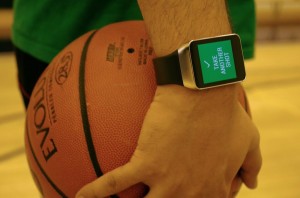 UTEST company Onyx Motion has partnered with NBA shooting guard Ben Gordon to raise the calibre of digital basketball coaching offered by the company’s first-of-its-kind technology, a smartwatch app that offers on-court skills guidance. The company announced Gordon’s role in helping to further develop the app, called Swish, on July 8 when launching their Indiegogo campaign.
UTEST company Onyx Motion has partnered with NBA shooting guard Ben Gordon to raise the calibre of digital basketball coaching offered by the company’s first-of-its-kind technology, a smartwatch app that offers on-court skills guidance. The company announced Gordon’s role in helping to further develop the app, called Swish, on July 8 when launching their Indiegogo campaign.
“We’re hoping to build a motion marketplace — a library of data, moves and audio tips from pro players,” said Onyx Motion co-founder and CEO Marissa Wu.
Onyx Motion’s Indiegogo crowdfunding campaign launch was covered by: TechVibes, Silicon Angle, IT Business.ca, Canadian Reviewer, Network World, GizMag and Sport Techie.
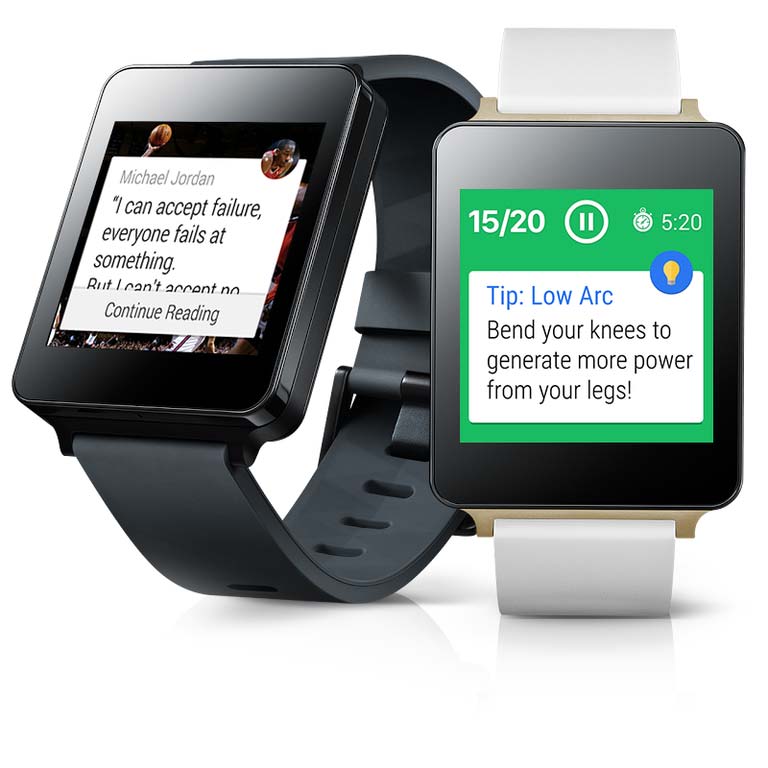 Swish uses smartwatch motion sensors to analyze athlete techniques and offer straightforward tips on how a player can improve.
Swish uses smartwatch motion sensors to analyze athlete techniques and offer straightforward tips on how a player can improve.
“The Swish technology is bringing users closer to their favourite basketball player by giving them the opportunity to learn from them,” said Gordon. “I’m excited to work with the team on the further development of this one-of-a-kind experience and help players at any level improve their game.”
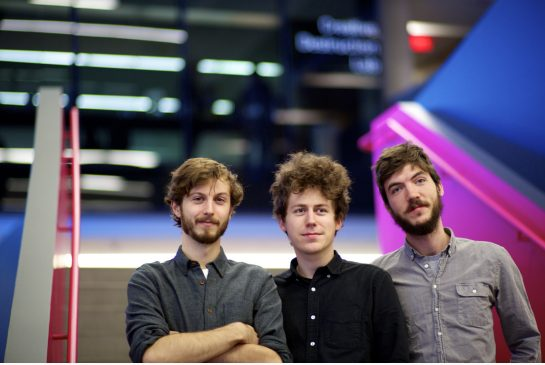
UTEST graduate Whirlscape was featured in Raju Mudhar’s Toronto Star article, “Toronto’s Whirlscape debuts tiny Minuum keyboard on iPhone,” which examines the company’s successful launch of their innovative, one-line keyboard for Apple’s iOS 8.
The UTEST program, co-directed by MaRS Innovation and the University of Toronto’s Innovations & Partnerships Office, gives nascent software companies start-up funding, office space, mentoring and business strategy support. Whirlscape was among the program’s first cohort.
The article was published October 6, 2014. Here’s an excerpt:
An Indiegogo success 18 months ago, the company created a tiny keyboard called Minuum for Android devices. Now, iOS and the vast Apple market beckoned. It required new hires, a couple months of round-the-clock development, and a practical rebuilding of their product from scratch so it could be ready to launch with iOS 8. All the work paid off: in the first two weeks of availability, they have sold more than 30,000 apps to the new iPhone audience.
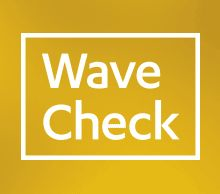 The WaveCheck crowdfunding campaign, which raised $53,390 on Indiegogo to support clinical trials for a clinical technique invented by researchers at Sunnybrook Health Sciences Centre and Ryerson University, was included in a new Canadian-led study on the merits of crowdfunding to support cancer and rare diseases.
The WaveCheck crowdfunding campaign, which raised $53,390 on Indiegogo to support clinical trials for a clinical technique invented by researchers at Sunnybrook Health Sciences Centre and Ryerson University, was included in a new Canadian-led study on the merits of crowdfunding to support cancer and rare diseases.
“Crowdfunding drug development: The state of play in oncology and rare diseases,” was published in Drug Discovery Today‘s June issue.
MaRS Innovation has confirmed with lead author Professor Nick Dragojlovic of the University of British Columbia that WaveCheck was among the campaigns included in the study.
OICR’s catalyst grant enables WaveCheck to open first partner site at MD Anderson Cancer Center in May
 TORONTO, April 8, 2014 — People with breast cancer are a step closer to knowing if their tumour is responding to chemotherapy at the start of treatment, thanks to a $100,000 catalyst grant from the Ontario Institute for Cancer Research (OICR).
TORONTO, April 8, 2014 — People with breast cancer are a step closer to knowing if their tumour is responding to chemotherapy at the start of treatment, thanks to a $100,000 catalyst grant from the Ontario Institute for Cancer Research (OICR).
The funding builds upon MaRS Innovation‘s Indiegogo crowdfunding campaign for WaveCheck, which successfully raised over $50,000 from over 500 supporters worldwide in two months last fall.
Read Jane Gerster’s article for the Toronto Star about OICR’s catalyst grant for WaveCheck. This announcement was also covered in Metro, BetaKit and Council of Academic Hospitals of Ontario’s Catalyst newsletter.
WaveCheck, a clinical technique invented, refined and tested by scientists at Sunnybrook Health Sciences Centre and Ryerson University over 20 years, aims to show whether chemotherapy is actually destroying a breast cancer tumour at the beginning of chemotherapy treatment (in as little as four weeks), rather than at the end of treatment (typically four to six months).
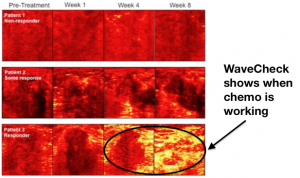
In early clinical testing, the non-invasive, image-guided technology has shown promise as an accurate, efficient way to monitor tumour response, opening the door to tailored treatment.
“This is a significant step towards achieving the goal of personalized medicine. The clinical trials will confirm that information provided by WaveCheck can determine if the treatment is the appropriate one or that other options should be chosen, sparing patients the side effects of treatments that will not likely be successful,” said Dr. Tom Hudson, OICR’s president and scientific director. “If successful, WaveCheck could become a standard tool in the cancer treatment of the future.”
University of Toronto Early-Stage Technology (UTEST) graduate Whirlscape Inc. released a video on February 25, 2014 showing how their Minuum keyboard can make typing on Smart TVs and consoles easy.
UTEST is currently accepting applications for its third cohort. Apply now.
Minuum, the “little keyboard for big fingers” is making waves in wearable technology with their disambiguation algorithm and advanced language modelling, which can be used on Android devices and smart watches.
Read Darrell Etherington‘s article about Minuum on Smart TVs and consoles in Tech Crunch and coverage in Geeky Gadgets, an online technology review and resource publication. You can also read more about the U of T science behind Minuum here.

MaRS Innovation’s Dr. Fazila Seker and Elizabeth Monier-Williams spoke with Deanna Pogorelc of MedCity News about how to define success for campaigns crowdfunding for technologies and research related to the medical field.
The article, in MedCity News‘ Hot Topics section, questions whether a crowdfunding campaign needs to reach its funding goal to be deemed successful.
Seker and Monier-Williams completed an Indiegogo crowdfunding campaign in December for WaveCheck, a clinical technique developed to let women and men know if their breast cancer chemotherapy is working within weeks of beginning treatment instead of months later when treatment has already ended.
Here’s an excerpt from the article:
Fazila Seker, the director of technology and venture development at commercialization agency MaRS Innovation, said that one of the trickiest things about the crowdfunding industry is the notion that these platforms have an established crowd that’s lurking around looking for the next best thing.
“You can’t rely entirely on that,” she said. “You need to go out there and do your research and create your own following.”
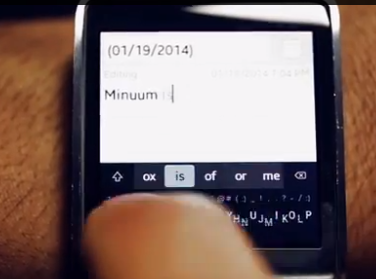
TORONTO, Canada (February 6, 2014) — Whirlscape Inc., creators of Minuum, “the little keyboard for big fingers,” have closed an investment seed round for just over $500,000 (USD). Y Combinator, FundersClub, BDC Venture Capital, and a dozen other prominent angel investors have contributed to the round.
Whirlscape’s plans for the capital involve innovating beyond its participation in Silicon Valley’s start-up accelerator Y Combinator. Whirlscape also aims to consolidate the success of its Minuum keyboard for Android touchscreen devices—available on Google Play—whose positive reviews have boosted sales since the New Year.
See articles of Whirlscape’s seed funding announcement by Darrell Etherington in TechCrunch, Ian Hardy in BetaKit, Rob Lewis in TechVibes and Global University Venturing.
Since launching the Minuum keyboard in 2013, Whirlscape has grown to a dedicated team of 10 working to enable new ways to type, and to unify input methods across the rapidly emerging field of wearable and ubiquitous computing devices such as smart watches and Google Glass. Whirlscape has recently demonstrated the Minuum keyboard working on Samsung’s Galaxy Gear smart watch.
“Our vision for the future of hyper-personalized input devices involves letting you choose your companion device for its input capabilities,” said Will Walmsley, CEO of Whirlscape. “By simplifying the concept of the keyboard, we allow text entry to occur in places where it was previously unthinkable, removing barriers to communication. Your keyboard can now be anywhere you want it to be, out of the way, yet immediately accessible.”
Whirlscape, Inc. was in the first cohort of UTEST, the MaRS Innovation and University of Toronto accelerator program for early-stage technologies. UTEST is now accepting applications for their third cohort.
 The Council of Academic Hospitals of Ontario’s online magazine highlighted WaveCheck on February 3, 2014 as a more personalized approach to cancer treatments because of the technology’s ability to effectively monitor chemotherapy response.
The Council of Academic Hospitals of Ontario’s online magazine highlighted WaveCheck on February 3, 2014 as a more personalized approach to cancer treatments because of the technology’s ability to effectively monitor chemotherapy response.
WaveCheck’s technology, invented by Dr. Gregory Czarnota of Sunnybrook Health Sciences Centre and Professor Michael C. Kolios of Ryerson University, allows women and men undergoing chemotherapy for breast cancer to know if their treatment is working at the beginning of treatment (within one to four weeks) rather than at the end of treatment (typically four to six months).
Here’s an excerpt from the article:
Breast cancer is the most common cancer among Canadian women, excluding non-melanoma skin cancers. It is the second leading cause of death from cancer in women in this country. The Canadian Cancer Society estimated that, in 2013, 65 Canadian women would be diagnosed with breast cancer every day, totaling 23,800 women a year; and 14 Canadian women would die from breast cancer every day, totaling 5,000 women a year. According to the Canadian Breast Cancer Foundation, one in nine Canadian women is expected to develop breast cancer during her lifetime; one in 29 will die from it.
 MaRS Innovation staff and WaveCheck Campaign Co-directors Dr. Fazila Seker and Elizabeth Monier-Williams spoke with the CBC’s Colleen Ross about the process of crowdfunding WaveCheck’s partner-based clinical studies on “The World This Weekend.”
MaRS Innovation staff and WaveCheck Campaign Co-directors Dr. Fazila Seker and Elizabeth Monier-Williams spoke with the CBC’s Colleen Ross about the process of crowdfunding WaveCheck’s partner-based clinical studies on “The World This Weekend.”
The radio segment, called “Crowdfunding Science,” aired on January 25, 2014 and discussed the lack of funding researchers have access to for commercialization, making it harder to advance research that could be helping people in a variety of industries.
To listen to the full interview, click here.
WaveCheck’s crowdfunding campaign is an example of how MaRS Innovation gets creative when traditional funding channels take too long or run dry, speeding up the commercialization process.